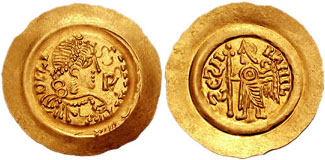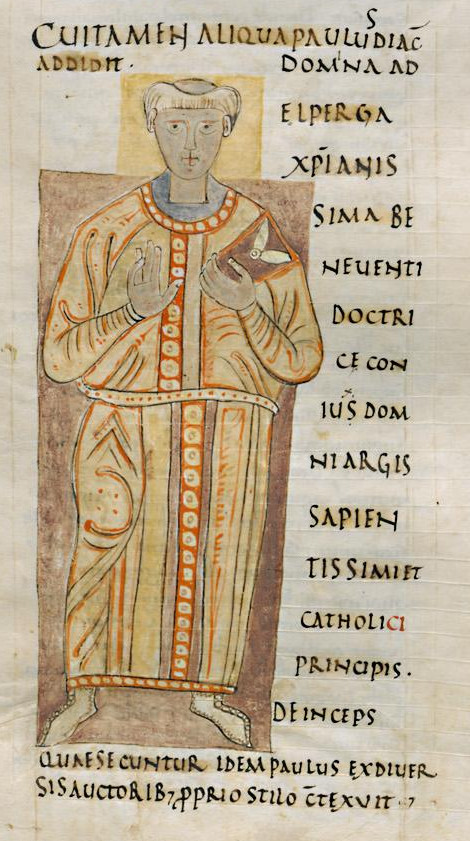|
Pemmo Of Friuli
Pemmo (or Penno) was the Duke of Friuli for twenty-six years, from about 705 to his death. He was the son of Billo of Belluno. Pemmo came to the duchy at a time when a recent civil war had ravaged the land. Pemmo raised all the children of the many nobles killed in the war in his own household next to his own sons. He also waged three wars with the Slavs of Carinthia. He defeated them so utterly the third time, that they entered into a peace treaty. Pemmo also quarrelled with Callistus, Patriarch of Aquileia. The patriarch was at odds with the bishop of Cividale and removed him. Pemmo, in response, arrested the patriarch. For this, King Liutprand descended on Friuli and appointed Ratchis, Pemmo's son, in his place. Pemmo fled with his followers, but his son secured his pardon. Pemmo left two other sons by Ratperga: [...More Info...] [...Related Items...] OR: [Wikipedia] [Google] [Baidu] |
Duke Of Friuli
The dukes and margraves of Friuli were the rulers of the Duchy and March of Friuli in the Middle Ages. The dates given below, when contentious, are discussed in the articles of the respective dukes. Lombard dukes * 568–c.584 Grasulf I * 568/c.584–590 Gisulf I, son of Grasulf I * 590–610 Gisulf II, son of Gisulf I * 610–617 Tasso, son of Gisulf II * 610–617 Kakko, brother of Tasso * 617–651 Grasulf II, brother of Gisulf II * 651–663 Ago * 663–666 Lupus * 666 Arnefrid, son of Lupus * 666–678 Wechtar * 678–??? Landar * ???–694 Rodoald * 694 Ansfrid * 694–705 Ado * 705 Ferdulf * 705–706 Corvulus * 706–739 Pemmo * 739–744 Ratchis, also king of the Lombards * 744–749 Aistulf, also king of the Lombards * 749–751 Anselm (d.806) * 751–774 Peter * 774–776 Hrodgaud Carolingian appointees Dukes * 776–787 Marcarius * 789–799 Eric * 799–808 Hu ... [...More Info...] [...Related Items...] OR: [Wikipedia] [Google] [Baidu] |
Belluno
Belluno (; lld, Belum; vec, Belùn) is a town and province in the Veneto region of northern Italy. Located about north of Venice, Belluno is the capital of the province of Belluno and the most important city in the Eastern Dolomites region. With its roughly 36,000 inhabitants, it is the largest populated area of Valbelluna. It is one of the 15 municipalities of the Dolomiti Bellunesi National Park. Geography The ancient city of Belluno rises above a cliff spur near the confluence of the Torrente Ardo and the Piave River. To the north is the imposing Schiara range of the Dolomites, with the famous ''Gusela del Vescovà'' (Bishopric's needle), and Mounts Serva and Talvena rising above the city. To the south, the Venetian Prealps separate Belluno from the Venetian plain. Also to the south is the Nevegal, in the Castionese area, a skiing resort. History The name of the city is derived from Celtic ''belo-dunum'' which means "splendid hill." The name was inspired by its fa ... [...More Info...] [...Related Items...] OR: [Wikipedia] [Google] [Baidu] |
Slavs
Slavs are the largest European ethnolinguistic group. They speak the various Slavic languages, belonging to the larger Balto-Slavic branch of the Indo-European languages. Slavs are geographically distributed throughout northern Eurasia, mainly inhabiting Central and Eastern Europe, and the Balkans to the west; and Siberia to the east. A large Slavic minority is also scattered across the Baltic states and Central Asia, while a substantial Slavic diaspora is found throughout the Americas, as a result of immigration. Present-day Slavs are classified into East Slavs (chiefly Belarusians, Russians, Rusyns, and Ukrainians), West Slavs (chiefly Czechs, Kashubians, Poles, Slovaks and Sorbs) and South Slavs (chiefly Bosniaks, Bulgarians, Croats, Macedonians, Montenegrins, Serbs and Slovenes). The vast majority of Slavs are traditionally Christians. However, modern Slavic nations and ethnic groups are considerably diverse both genetically and culturally, and relations between the ... [...More Info...] [...Related Items...] OR: [Wikipedia] [Google] [Baidu] |
Carantania
Carantania, also known as Carentania ( sl, Karantanija, german: Karantanien, in Old Slavic '), was a Slavic principality that emerged in the second half of the 7th century, in the territory of present-day southern Austria and north-eastern Slovenia. It was the predecessor of the March of Carinthia, created within the Carolingian Empire in 889. Origin of the name The name ''Carantania'' is of proto- Slavic origin. Paul the Deacon mentions ''Slavs in Carnuntum, which is erroneously called Carantanum'' (''Carnuntum, quod corrupte vocitant Carantanum''). A possible etymological explanation is that it may have been formed from a toponymic base ''carant-'' which ultimately derives from pre-Indo-European root *''karra'' meaning 'rock', or that it is of Celtic origin and derived from *''karant-'' meaning 'friend, ally'. Its Slavic name ' was adopted from the Latin *''carantanum''. The toponym ''Carinthia'' (Slovene: < |
Cividale
Cividale del Friuli ( fur, Cividât (locally ); german: Östrich; sl, Čedad) is a town and '' comune'' in the Province of Udine, part of the North-Italian Friuli Venezia Giulia ''regione''. The town lies above sea-level in the foothills of the eastern Alps, by rail from the city of Udine and close to the Slovenian border. It is situated on the river Natisone, which forms a picturesque ravine here. Formerly an important regional power, it is today a quiet, small town that attracts tourists thanks to its medieval center. History Archaeological findings reveal that the area was already inhabited in Paleolithic and Neolithic times. During the Iron Age the region was settled by Veneti and Celts. Due to the location's strategic position on the northeastern frontier of Roman Italy, in 50 BC, the Romans founded there a ''castrum'', which afterwards was transformed by Julius Caesar into a ''forum'' and its name changed into ''Forum Iulii'' ("Julius' marketplace"; Fréjus had the same ... [...More Info...] [...Related Items...] OR: [Wikipedia] [Google] [Baidu] |
Liutprand, King Of The Lombards
Liutprand was the king of the Lombards from 712 to 744 and is chiefly remembered for his multiple phases of law-giving, in fifteen separate sessions from 713 to 735 inclusive, and his long reign, which brought him into a series of conflicts, mostly successful, with most of Italy. He is often regarded as the most successful Lombard monarch, notable for the Donation of Sutri in 728, which was the first accolade of sovereign territory to the Papacy. Early life Liutprand's life began inauspiciously. His father was driven to exile among the Bavarians, his older brother Sigipert was blinded by Aripert II, king of the Lombards, and his mother Theodarada and sister Aurona were mutilated (their noses and ears were cut off). Liutprand was spared only because his youth made him appear harmless, described as adolescens in Paul the Deacon's ''Historia Langobardorum'' (Book VI, xxii), suggesting that he was 'probably older than 19 but still in his twenties'. He was released from Aripert II' ... [...More Info...] [...Related Items...] OR: [Wikipedia] [Google] [Baidu] |
Ratchis
RatchisAlso spelled ''Rachis'', ''Raditschs'', ''Radics'', ''Radiks''. (died after 757) was the Duke of Friuli (739–744) and then King of the Lombards (744–749). Ratchis was the son of Duke Pemmo of Friuli and the nephew of the Lombard king Liutprand, who, despite his history of strife with Pemmo, appointed Ratchis to succeed his father in 737. Ratchis was married to a Roman woman named Tassia. During his rule of Friuli, he launched an expedition against the Slavs in Carniola, across the Eastern Alps, fighting in person during the battles. He became king of the Lombards in 744, after the deposition of Hildeprand, most likely with the support of the more autonomous Lombard dukes. Ratchis ruled initially in peace, in particular with the neighboring Byzantine-ruled exarchate of Ravenna. However, perhaps pushed by more traditional parties among his followers, in 749 he invaded the Duchy of the Pentapolis and besieged Perugia. Pope Zachary convinced him to lift the siege, b ... [...More Info...] [...Related Items...] OR: [Wikipedia] [Google] [Baidu] |
Aistulf
Aistulf (also Ahistulf, Aistulfus, Haistulfus, Astolf etc.; it, Astolfo; died December 756) was the Duke of Friuli from 744, King of the Lombards from 749, and Duke of Spoleto from 751. His reign was characterized by ruthless and ambitious efforts to conquer Roman territory to the extent that in the '' Liber Pontificalis'', he is described as a "shameless" Lombard given to "pernicious savagery" and cruelty. Biography Aistulf was born as the son of Duke Pemmo of Friuli and his wife Ratperga. After his brother Ratchis became king, Aistulf succeeded him as Duke of Friuli and later succeeded him as king, when Ratchis was forced to abdicate the throne. Ratchis entered a monastery thereafter. While Ratchis had been more tolerant with the Roman element of the Italian population, Aistulf followed a more aggressive policy of expansion and raids against the Papal States and the Eastern Roman exarchate of Ravenna. In 750, Aistulf captured Ravenna and all the provinces subject to the ... [...More Info...] [...Related Items...] OR: [Wikipedia] [Google] [Baidu] |
Paul The Deacon
Paul the Deacon ( 720s 13 April in 796, 797, 798, or 799 AD), also known as ''Paulus Diaconus'', ''Warnefridus'', ''Barnefridus'', or ''Winfridus'', and sometimes suffixed ''Cassinensis'' (''i.e.'' "of Monte Cassino"), was a Benedictine monk, scribe, and historian of the Lombards. Life An ancestor of Paulus's named Leupichis emigrated to Italy in 568 in the train of Alboin, King of the Lombards. There, he was granted lands at or near ''Forum Julii'' ( Cividale del Friuli). During an invasion by the Avars, Leupichis's five sons were carried away to Pannonia, but one of them, his namesake, returned to Italy and restored the ruined fortunes of his house. The grandson of the younger Leupichis was Warnefrid, who by his wife Theodelinda became the father of Paul. Paulus was his monastic name; he was born Winfrid, son of Warnefrid, between 720 and 735 in the Duchy of Friuli. Thanks to the possible noble status of his family, Paul received an exceptionally good education, probably a ... [...More Info...] [...Related Items...] OR: [Wikipedia] [Google] [Baidu] |
Corvulus Of Friuli
Corvulus (also Corvolus) was the Duke of Friuli for a brief spell in the early eighth century AD (probably 705 or 706). He replaced Ferdulf, but he offended King Aripert II and was arrested and his eyes gouged out. He lived in obscurity and shame as a blind exile thereafter, according to Paul the Deacon. He was ultimately replaced by Pemmo. "Corvulus" literally means "little raven" in Latin, so this may have been a hypocoristic or Latinization for the Duke's real birth name (as a likely ethnic Lombard who assimilated to Italo-Roman culture). Sources * Paul the Deacon''Historia Langobardorum'' Translated by William Dudley Foulke William Dudley Foulke (November 20, 1848 – May 30, 1935) was an American literary critic, journalist, poet and reformer. Biography William Dudley Foulke was born in New York City on November 20, 1848. He graduated Columbia University in 1869 .... University of Pennsylvania: 1907. * Hodgkin, Thomas. ''Italy and her Invaders''. Clarendon Press: 1 ... [...More Info...] [...Related Items...] OR: [Wikipedia] [Google] [Baidu] |
Dukes Of Friuli
Duke is a male title either of a monarch ruling over a duchy, or of a member of royalty, or nobility. As rulers, dukes are ranked below emperors, kings, grand princes, grand dukes, and sovereign princes. As royalty or nobility, they are ranked below princess nobility and grand dukes. The title comes from French ''duc'', itself from the Latin ''dux'', 'leader', a term used in republican Rome to refer to a military commander without an official rank (particularly one of Germanic or Celtic origin), and later coming to mean the leading military commander of a province. In most countries, the word ''duchess'' is the female equivalent. Following the reforms of the emperor Diocletian (which separated the civilian and military administrations of the Roman provinces), a ''dux'' became the military commander in each province. The title ''dux'', Hellenised to ''doux'', survived in the Eastern Roman Empire where it continued in several contexts, signifying a rank equivalent to a capt ... [...More Info...] [...Related Items...] OR: [Wikipedia] [Google] [Baidu] |
.jpg)


